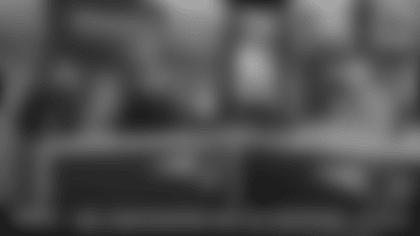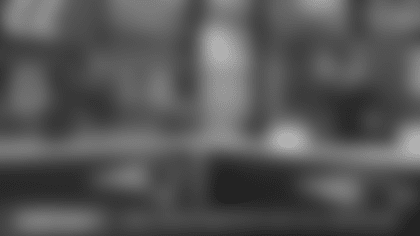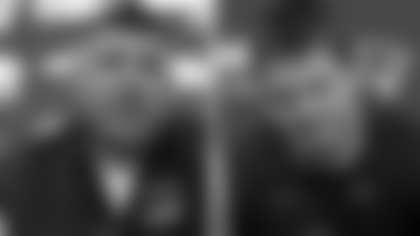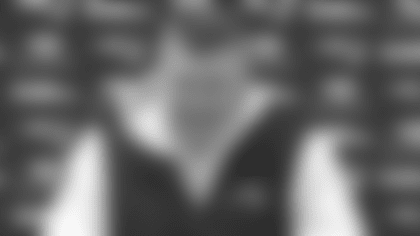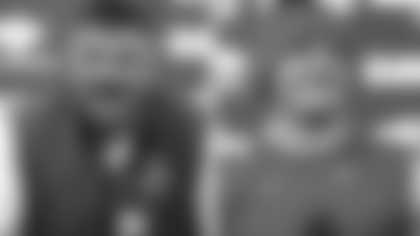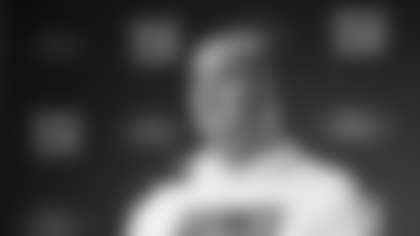PATRIOTS HEAD COACH JEROD MAYO
PRESS CONFERENCE
September 11, 2024
JM: Good afternoon. First of all, today is a day of remembrance for 9/11. To all the servicemen, first responders, just want to let them know that we appreciate them. The squad meeting was a reminder of how old I'm getting, that we have people in the squad room that didn't live that experience. Everyone in here did live that experience, and we remember where we were during that experience, and I don't want that to go unnoticed. Secondly, I would say just to wrap up last week before, we get on to Seattle, I do think it's important to recognize some of the players that may not get all the stories written about them. We have practice players of the week. I tell the guys every week that the process is important. The practice players make sure they do a good job going out there, giving us a good look and preparing us for the game. Going forward, only after wins, we'll have a list of practice players. So for this week, it was Eric Johnson, Ochaun Mathis, Joe Giles-Harris, A.J. Thomas, Joe Milton, Kayshon Boutte, [Mitch] Wilcox and Curtis Jacobs. I thought those guys went out there and gave us a good look and gave us a chance to win the football game.
Q: Going back to your first statement, what are your thoughts on Joe Cardona and what he does on and off the field?
JM: I have nothing but love and respect for Joe [Cardona]. I actually had him go up and speak to the team and, when that [9-11-2001] happened, what he talked about was the rallying of all 18-year-olds that really are like, 'We got to sign up, join the military protect our nation.' Joe has two jobs. He has two jobs and football is the second one. The first one is as a serviceman to serve our country. I think all the players in the locker room understand how tough it is for him. At the same time, I have a great appreciation for everything he does.
Q: Can we go down that road a little further? I think you were probably in high school at the time [of 9/11]?
JM: I was in school. I just remember everyone having to go to the cafeteria, and they just turned on the TVs and it was crazy. I'm a military brat. My grandfather was a Chief Master Sergeant. My Mom's in the military as a civilian. My stepdad's also in the military. I understood what was going on. At the same time, it was one of those things where you just feel like you're in a dream, and you don't think it's real. I will say there is significance even here in the Northeast. I think both of the flights took off from Boston. So it's definitely significant here in this region.
Q: You mentioned your age just in that opening statement, which was very thoughtful. Going up against Mike Macdonald, another young rookie coach in Seattle. Have you guys crossed paths much? Have you been able to discuss coming from similar defensive backgrounds or anything along those lines?
JM: No, we haven't had any conversations there. I've had conversations with other coaches around the league, but I haven't had the privilege to meet with Mike [Macdonald].
Q: Jerod, Mike [Macdonald] led one of the better defenses in the league last year in Baltimore. As you study them, their system, what stands out about the way they like to play?
JM: Everyone is a threat. When we talk about known rushers, it's really the unknown rushers that make that Baltimore defense special. You don't know who's coming. They drop out defensive ends. They do things that are very similar to some of the things that we do as well, the zone blitzing and protecting the deep part of the field. Historically they've always had a good defense, and they have a bunch of good players.
Q: Jerod, you said after the game some of the players were saying 'take them to the hill.' Is that something you've heard before? What's your reaction to that?
JM: No, that was the players. We talked about artificially creating adversity during practice. One of those ways is to go to the hill after a two hour and 15 minute practice where you go one or two ways. One way is like, 'oh man, I got to go to the hill.' The other way is, 'all right, we've got to break down through this wall, and push our bodies.' Most of the time, and I tell the guys this all the time, your mind is going to give up before your body gives up. Being able to go to the hill or take them to the deep water, as we like to say, because we do have a lot of faith in our conditioning and what we've gone through throughout the summer. The guys that started saying, 'take them to the hill' during that fourth quarter. I love it. That was from the players.
Q: Did you end up joining as a player when the hill was here?
JM: Yeah, I did. One thing I would say is, at least from my perspective, it was always one of those times where I'm just going to prove everybody wrong anyway. In college, I remember making coaches so mad because what they would do, if someone was late, they would get the whole team up and we would have to run, and that one guy wouldn't run [laughs]. I used to make the coaches mad because I would just keep running. I'd be laughing the entire time. Being able to do that in tough times is definitely a good thing.
Q: I want to ask about Javon Baker. He was a healthy scratch on Sunday. Was that disciplinary at all?
JM: I don't want to get into a lot of that. What I will say is he [Javon Baker] has to continue to progress and continue to develop, both on the field and off the field, and that's my responsibility ultimately.
Q: Jerod, what did Seattle show you offensively that has your eye on Sunday?
JM: Most of the time, we always talk about the quarterback, which they have an experienced quarterback. What I would say is the run game. I think Kenneth [Walker III] doesn't get a lot of hype. I don't know what his Madden rating is or anything like that, but when you turn on the film, this guy pops off the film. He's a very aggressive runner. He can do it all. Then you look at the receivers. They have different skill sets. There's a huge contrast between [Tyler] Lockett and [DK] Metcalf, but they have a good team. They have a good offense.
Q: Jerod, how difficult is it to game plan against a team that only has one game of film?
JM: This is why I always preach about awareness. It goes back to that conversation about awareness. You can watch the film and at some point during the game, they will revert back to who they are. In saying that, most teams script the first 15 plays as key plays to get the ball in the hands of one of the guys that has to get started early. Same thing in the second half. You take the first 15 plays that are scripted to break the tendencies that we've watched on film. This is why awareness, in my opinion, is more important than, '60% of the time when they're in the gun, they're doing this,' for example.
Q: You talked a little bit about Jacoby Brissett's ability to make plays with his legs. What have you seen from him and his ability to evade pressure?
JM: He [Jacoby Brissett] has a good pocket presence. This is a veteran player that went out there and did everything we expected him to do. We talk about not turning over the ball, and not taking negative plays. I thought he did a good job with that. Historically, he has done a good job with that. Hopefully this week, we'll see some progress.
Q: Jerod, you quoted Mike Tyson the other day, 'everyone has a gameplan until they get punched in the mouth.' Going into that first game, you had some ideas of what this team's all about. How important is that second week getting ready now that you have a better idea of the team?
JM: From an individual perspective, the biggest jump you should see out of your players is from year one to year two, or week one to week two. I would say this week, not to look back at Cincinnati, but there are a lot of plays that we left out there. I think the players recognize that. Once you go to week two, we expect everyone to be better. We know who's going to be out there in our units. You guys can stop asking about the offensive line and the quarterback [laughs]. Now it's the time for those guys to gel. We as coaches expect them to be better. And I did let them know, 'what got us the win in week one won't get us the win in week two if we don't continue to improve.'
Q: You guys were underdogs in week one. You went into Cincinnati and won the game. You're underdogs again now at home here against Seattle. Is that something that you relish as a team, that underdog status? Do the players talk about it?
JM: No, they don't really talk about that. This goes back to the whole motivation conversation. It's about discipline. I told you guys last week, there was no secret. We were going to run the football. Same thing with the players. If they talk to you guys, 'I'm the best receiver in the world,' you put it out there, but now you got to go out there and do it. That's how I look at it.
Q: Coach, it was a relatively quiet day from the receivers. What did you see from that group on tape?
JM: Yeah, those guys were doing the dirty work. I would also say if you turn on the film, we had guys open. When you go back to getting better from week one to week two, we just got to find those guys and give them an opportunity to make plays.
Q: Hey Jerod. After the game we learned you talked to Rhamondre [Stevenson], and you told him he might not be the highest rated [running] back in league, but you thought he was one of the best. Jacoby [Brissett] talked about your conversation with him and how he cried before the game. Speaking to the players like that, was there an experience in your career where someone sent a message to you that really gave you affirmation?
JM: I've always dealt with the imposter syndrome, where I always felt like I just wasn't good enough. I would just work extra hard. I can't really put my finger on what a coach said. I'm sure I had a coach over the years say something that changed the trajectory of my career. My thing is with the players, there's an element of the individual relationship, and also the team relationship. I just try to offer encouragement to some of the guys that need that little extra push. I've always thought that Rhamondre [Stevenson] was one of the best backs in the league. I've always thought that. A guy that can do it all, catch the ball at the backfield, a very patient runner that can break tackles. Last week you got an opportunity to really see what he could do. I'm not going to get into what was said in those conversations, but it's like one of those last minute, 'you can do this' messages. Going back to the anxiety versus excitement, sometimes just having someone come and put a hand on your shoulder like, 'hey, you're going to go out there and perform well,' is all you need.
Q: I'm curious if you have a take on what happened with Tyreek Hill in Miami, and if you felt a need to talk to the team about it, or use it as some kind of teaching tool?
JM: I'm not going to get too far into that. What I will say is that I met with the captains and we had a conversation on how to approach it as a team. Those guys handled it in the locker room. It is a conversation we had, and we'll see how it goes, and how it looks going forward.
Q: When you broadcast, 'we're going to be a running football team.' 'That's who we are, but we don't care who knows.' Eventually, there's an offensive philosophy that every defense can say, 'they're not running on us,' and they'll commit everyone…
JM: And then we turn into a pass team [laughs]. When I say we're going to run the ball, if you want to load up the box, then we'll throw the ball. This is why I always tell the receivers, 'run the route like you're getting the ball each and every play,' because the game changes. It's one thing to sit there and say, 'this is the game plan on Wednesday, Thursday and Friday.' I talk about mental agility and being able to really change, instead of being rigid. We can't be rigid in the way we play. We can't be rigid in the way that we think. Who knows? This week, Jacoby [Brissett] may throw for 300 yards or Rhamondre [Stevenson] may run for 200 yards. I really don't know. That's why I come out here to say it.








